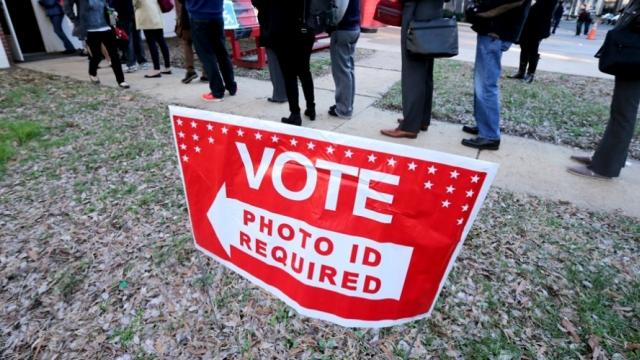
Wisconsin's voter ID law may have suppressed a stunning 200,000 votes in the 2016 presidential election, a study shown exclusively to The Nation has revealed, and the law disproportionately kept Democratic and African-American voters from the polls.
President Donald Trump won Wisconsin by a mere 22,748 votes.
The study by Priorities USA, a group affiliated with the Democratic Party, looked at states that had passed strict voter ID laws since the 2012 election, comparing them to states that did not. According to The Nation's Ari Berman, the study found:
"While states with no change to voter identification laws witnessed an average increased turnout of +1.3 percent from 2012 to 2016, Wisconsin's turnout (where voter ID laws changed to strict) dropped by -3.3 percent. If turnout had instead increased by the national- no-change average, we estimate that over 200,000 more voters would have voted in Wisconsin in 2016. The lost voters skewed more African-American and more Democrat. For example, Wisconsin's 2016 electorate was 6.1 percent more Republican, and 5.7 percent less Democrat, than the group of 'lost voters.' Furthermore, the WI electorate was 3.7 percent more White and 3.8 percent less African American than the group of 'lost voters.' This analysis suggests that the 200,000 lost voters would have both been more racially diverse and have voted more Democratic."
Wisconsin's stringent voter ID law requires voters to present a state driver's license, military ID card, U.S. passport, or tribal ID card. Voters may also present a student ID card, but only if the student ID card includes a photo, date of issuance, signature, and two-year expiration date, and is accompanied by a separate document proving enrollment.
"Though Wisconsin saw the most dramatic reduction in turnout among voter ID states, it was reflective of a worrisome broader national trend," observes Berman, quoting the study further:
"In states where the voter identification laws did not change between '12 and '16, turnout was up +1.3 percent. In states where ID laws changed to non-strict (AL, NH, RI) turnout increased less, and was only up by +0.7 percent. In states where ID laws changed to strict (MS, VA, WI) turnout actually decreased by –1.7 percent."
2016 was also the first presidential election since the Supreme Court stripped voters of the 1965 Voting Rights Act's protections, and many voters in critical swing states reported long lines and intimidation at polling sites, as Common Dreams reported at the time.
The Associated Press spoke to multiple Wisconsinites who discovered to their dismay that they would not be able to vote in the November election. In one poignant story, an elderly couple found themselves turned away by poll workers who knew them personally:
"When Alvin Mueller retired from his job as a maintenance worker, his wife Margie, 85, quit driving and let her license expire in 2010. The couple never had trouble voting in Plymouth, a small city about an hour's drive north of Milwaukee where they've lived since they married 65 years ago. But they hit a snag during early voting in November because Margie Mueller couldn't cast a ballot with her expired license. The staff at the city clerk's office said if she wanted to vote, she would need to get a new ID at a DMV office about 15 miles away in Sheboygan, the county seat, Alvin Mueller recalls. That's not unusual. The Brennan Center estimated that in the 10 states with voter ID laws in 2012, more than 10 million eligible voters lived more than 10 miles from a state ID-issuing office that is open more than two days a week. Alvin Mueller said his wife was battling cancer in her lymph nodes and lungs. The prospect of making the trip to Sheboygan was overwhelming. Not only did they not make the drive — Alvin decided if his wife couldn't vote, he wouldn't either. It's not like they were strangers to the poll workers: 'We voted in Plymouth here for years. They know us and everything,' he said."
Another woman who was turned away at the polls—despite presenting a Social Security card, a Medicare card, and a county-issued bus pass that showed her photo—told the AP: "There is no understanding this. It was unfair, and I think it was cruel."
3 WAYS TO SHOW YOUR SUPPORT
- Log in to post comments













